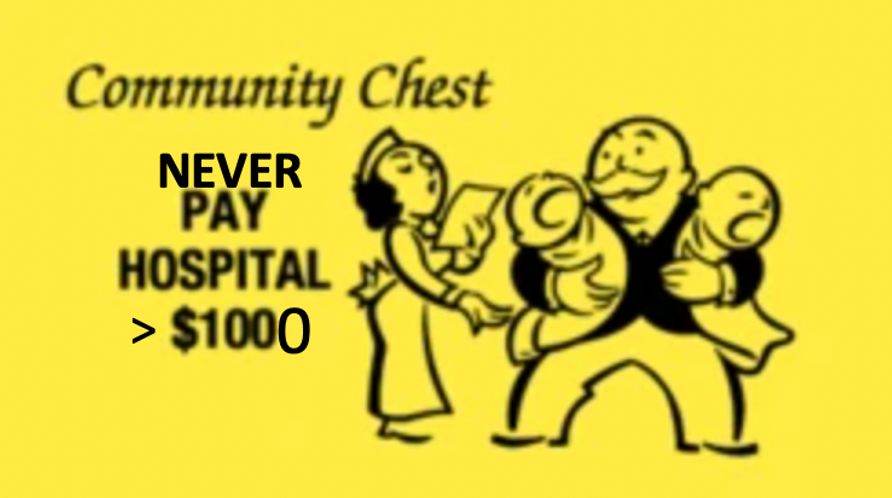How Quizzify weaponizes direct hospital contracting
- Jun 27, 2021
- 4 min read
Updated: Jul 25, 2021
This is the sequel to Quizzify earns total victory in surprise bill dispute.
By way of background, the actual language is now:
Superseding form consents, I consent to responsibility (including insurance) for up to 2 times Medicare following receipt of an itemized bill for appropriate treatment.
Putting this language right on your employees’ insurance card protects them from being overcharged, or forced into arbitration. It covers all non-elective care except free-standing ERs and ambulances not owned by hospitals. This "battlefield consent," to use Marty Makary's term, is protected by federal law -- the Emergency Medical Treatment and Active Labor Act of 1986 (EMTALA).
More background/success stories can be found in the New York Times, and in this other first-hand account. Marshall Allen's excellent new book, Never Pay the First Bill,* also features the language.
How this language is a game-changer for hospital direct contracting
Large employers with geographically concentrated populations, like cities and states, will soon realize that equipping employees with this language is directing contracting, at least as far as non-electives are concerned. It’s not a negotiation. It's a win. Congratulations.
Our/your breakthrough is recognizing that any non-elective hospital service is covered by EMTALA, requiring hospital to treat the patient up to a point. The hospital either accepts the language (as every hospital has so far, now that this most recent one is in the “win” column), or they reject it, treat the patient as required, and then sue. But we’ll set you up for that possibility, and the hospital will fold, period.

Why? Because the Quizzify language specifies “2x Medicare” in order to show that the patient proposed a reasonable counter-offer. This is a step up from Dr. Makary’s “battlefield consent” that inspired the Quizzify language. His consent was just rejection of the form consent, not a counteroffer. (While credit is being given, Marilyn Bartlett gets credit for using reference-based pricing for direct hospital contracting. All I did was put Marty's chocolate together with Marilyn's peanut butter to create a direct contracting Reese Cup.)
In the original battlefield consent, litigation after the fact was expected since no contract was established. The new consent establishes a contract if the hospital treats the patient without objecting to the Quizzify consent.
Here's why the hospital won't sue.
If the hospital loses in a court other than small claims, their pricing structure is toast. Precedent is set. Even losing in small claims court is a risk. It’s not legal precedent but it is certainly admissible. Plus, word will get out. And losing in court means the hospital can’t make the patient sign an NDA. Consequently, no hospital will pursue the patient. Quizzify will 100% guarantee our fees that if they do, they will lose.
***Do not put this language on the insurance card if you want to direct-contract! This language will need to be printed on a separate card since the provider-insurer contract is not involved. ***
Other than that, the only two add-ons to get started are:
Employee education in using the language (Quizzify’s stock-in-trade) and
A person or a service to facilitate reimbursement for the employee, who is not going through insurance automatically at the point of intake.
From the employer side, there is no reason to require employees to use the language, which would necessitate a benefits design change. Simply offer to reduce or waive the copay for anyone who uses the card with that language, and teach them about it.
After some employees use the language successfully, you'll have a track record (just like we already have) to then approach hospitals holding the ace of spades. You can say: "We will give all our employees this card and broadcast this language all over your marketplace unless you come to the table and direct-contract for everything else."

One might ask, why hasn’t this language/technique already been applied to negotiations? There is a certain too-good-to-be-true element. You’ve been losing this battle for years, and suddenly a magical solution is developed where you win. You simply have to allow yourself to consider the possibility that an entirely different approach is obviously better than business as usual.
Quite literally, one reason purchasers balk at Quizzify in general is that our entire business model sounds too good to be true. We guarantee 100% of our fees for any combination you choose of:
a 5-to-1 ROI (over 1000 employees and using our standard curriculum)
The same is true here. Our approach is so successful that we can guarantee 100% of our fees.
This language can also be automatically added to reference-based pricing
Reference-based pricing (RBP) is generally used for electives. This language applies the RBP concept to non-electives. The same procedures can be followed by the employee in the event of denial as you normally have in place for RBP disputes – provided you have trained your vendor how to negotiate using this language, which is actually easier than with RBP disputes involving electives.
That’s because EMTALA requires a hospital rejecting the employee’s financial consent to treat the patient anyway, up to a point. While ER visits and emergency deliveries are treated the same way whether or not the hospital accepts the language, a hospital is well within its rights to transfer a stabilized inpatient who continues to refuse to sign their consent. (This situation will arise so rarely that we are unaware of it happening at all.)
*In case you are keeping score at home, Marshall’s is the second healthcare industry bestseller in the last two years to feature Quizzify. Marty Makary’s The Price We Pay was the first. ("Using a comedic, engaging style, Quizzify educates people on highly relevant techniques they can use to make everyday decisions from how to read a nutrition label to how to ask questions about common medical procedures.")



